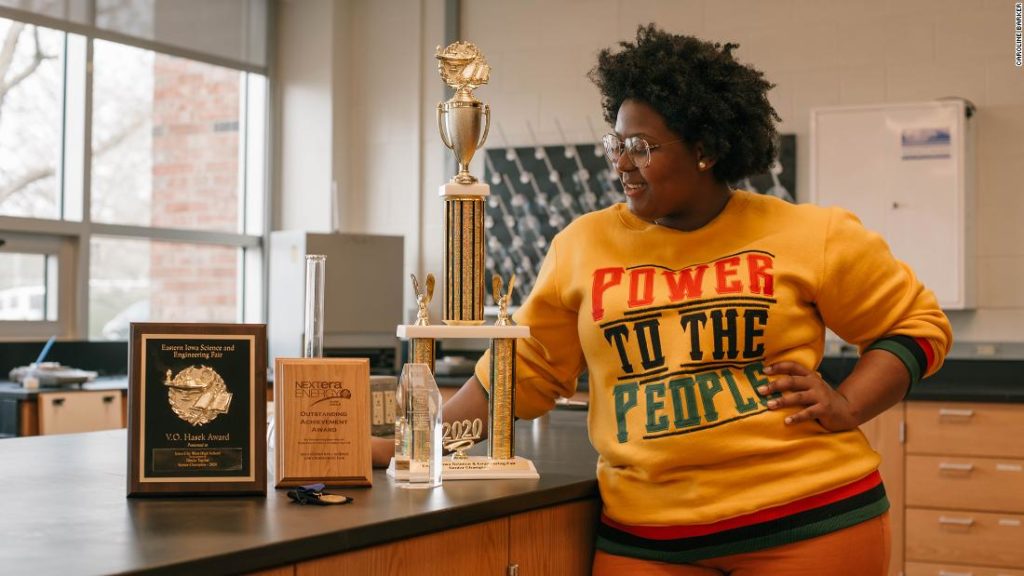Over a year later, she’s seeking a patent for a creation she carefully curated in her high school chemistry lab: color-changing stitches that indicate when a wound is infected.
The key to her success? Covering the stitches in beet juice.
“I dabble in science,” Taylor, who is now a senior, told CNN. “It’s been an amazing experience because I’ve never done any research prior to this project.”
The accolades aren’t what matters, she says. Now, she’s focused on making sure the sutures actually help people.
“Equity work has my heart, and that’s what I want to do for my career,” Taylor said. “I do plan on continuing my research, and ensuring that this project is released and people actually get this discovery, and it will save lives.”
She wanted to make new inventions equitable
“I classify my research as where equity meets science,” Taylor said. “The people who are really going to need (smart sutures) will not be able to afford it … so I decided to take that and run with it and make something cost-effective.”
Her stitches operate using simple chemistry. While human skin is naturally acidic, or around a pH of 5, Taylor explained, infected wounds have a basic pH, meaning it’s 8 or higher. A natural indicator — in this case, a beet mixture — can change color based on the pH of something.
Beets change color “very quickly” right around when skin’s pH becomes basic, Taylor found, going from a healthy light purple to a darker magenta as pH increased — the ”perfect” natural indicator, she said. After creating variations of a beet concoction, Taylor combined the dye with the sutures to create an item that could detect infection at the correct pH levels, completing Phase 1 of her research by February 2020.
She excelled in competition
Upon taking the sutures to competition in February 2020, the invention was an immediate success. At her first competition, the regional Junior and Science Humanities Symposium, Taylor said she “dominated,” taking home first place and numerous other awards.
Taylor credited her success in large part to Walling’s help. Walling, who has recruited students for science fairs for around 10 years, told CNN this is the first time she’s seen a student make it this far in competitions.
“The reason why she did as well as she did in my opinion is that she was just interested, like she just kept wanting to know why and how can this work and what can we do with it,” Walling explained.
Despite pandemic limitations, Walling recalled that Taylor was determined to continue her research. She worked with administrators to use the chemistry lab in August, incorporating judge feedback from the previous season and beginning Phase 2 of her research.
Taylor also sought insight from University of Iowa microbiologist Theresa Ho, after realizing beets have antibacterial properties.
And her work has inspired others
Taylor recalled how an elementary teacher in Massachusetts asked their students to read about Taylor’s work and write a paragraph about why she inspired them. Upon receiving a 24-page document from the teacher with all the students’ thoughts, Taylor said she cried.
“I consider changing the world inspiring the next person, like if I get to inspire someone to go do something great, that’s what success is in my mind,” Taylor said.
While Taylor plans to major in political science on a pre-law track, she encourages anyone remotely interested in science to pursue it, saying, “If you’re curious about something, research it.”
In that spirit of discovery, Taylor has encouraged kids in her hometown to get involved with science, from hosting a kids science program with her local public library to holding Zoom discussions with elementary students. But Taylor isn’t just inspiring kids; Walling said Taylor “inspires her” and anyone else she’s around.
“She doesn’t just push herself to be better, she wants everyone to be better,” Walling said.
“It’s just so amazing to see how I’m already changing the world in really just being myself and having fun and exploring my intellectual horizons,” Taylor said. “I just never knew I was gonna do all of this at 17 years old.”
You may also like
-
Afghanistan: Civilian casualties hit record high amid US withdrawal, UN says
-
How Taiwan is trying to defend against a cyber ‘World War III’
-
Pandemic travel news this week: Quarantine escapes and airplane disguises
-
Why would anyone trust Brexit Britain again?
-
Black fungus: A second crisis is killing survivors of India’s worst Covid wave

